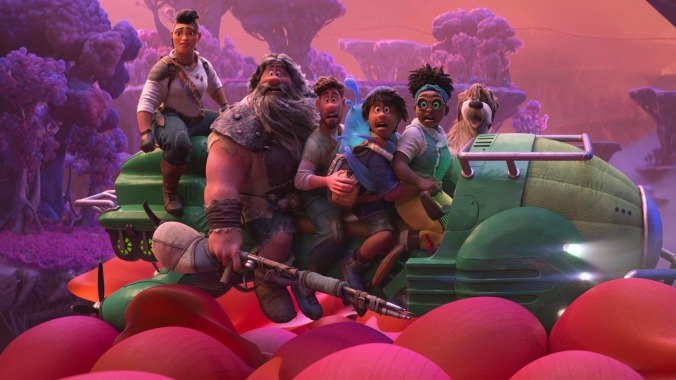Strange World finally delivers the queer version of Disney magic we've been waiting for
Disney's sci-fi epic embarks on an old-school animated adventure with modern sensibilities

In recent years, the parade of family friendly animated films has seemingly stumbled upon two paths diverging in a wood. On one side are the heavily merchandised, brightly colored, fart-joke-infused films geared at elementary school kids. On the other are the weepy, melancholic tales of loss, supposedly made for kids, but that feel much more like they’re the internal monologues of 40-something screenwriters. Down one path trot Minions, Cars, and Trolls, down the other Soul, Up, and Inside Out. But now, Disney’s latest animated feature Strange World arrives in theaters, bivouacking into uncharted territory. It somehow harkens back to the adventures of Hercules, A Bug’s Life, and Aladdin, yet feels completely unlike anything the studio has produced before.
Much of the film’s bold freshness comes with the arrival of Disney’s “first out gay teenager.” After several years of Disney/Marvel/Pixar/Star Wars inserting easily deleted queer characters into their films with little acknowledgment of their queerness (even Black Panther: Wakanda Forever includes a ready-to-cut LGBTQ+ character), they are finally giving us a substantial gay storyline in a children’s film.
The LGBTQ+ character in question is Ethan Clade (voiced by The Daily Show’s Jaboukie Young-White), a teen gamer hungry for adventure and swooning over his bestie Diazo (Jonathan Melo), the youngest of a trio of Clade men at the story’s core. Ethan is constantly embarrassed by his sweetly dorky and overly involved dad, a farmer named Searcher Clade (Jake Gyllenhaal). Searcher is a local celebrity in the gorgeous but secluded land of Avalonia, for discovering electricity in the form of Panto, a plant he unearthed while on a fateful mission with his father Jaeger Clade (Dennis Quaid). Jaeger, a career explorer dead-set on making it over the mountains that surround Avalonia, abandoned Searcher during one such quest, never to be seen again.
While Searcher, Ethan, and his mom Meridian (Gabrielle Union) are living a happy (if, for Ethan, slightly embarrassing) existence in now electricity-rich Avalonia, they are visited by President Callisto Mal (Lucy Liu), who informs them that the Panto, their power supply, is dying, and that they must travel into an unexplored subterranean “strange world” to save their kingdom. The Clades, along with their adorable three-legged dog, quickly find trouble in the new brightly colored land full of new brightly colored creatures. They discover a grizzled Jaeger, befriend a non-verbal blob, and narrowly avoid being eaten by sinister tentacled pods as they press on past acid lakes and walking trees. And while the adventure unfolds, the trio of Clade men must unpack their various daddy issues—smothering, abandonment, lack of appreciation for each other’s work, and of course the inability to civilly play Ethan’s card game.
The beauty of Strange World is that director Don Hall and writer Qui Nguyen, the team behind the under-appreciated Raya And The Last Dragon, never make Ethan’s queerness the issue. It is central to his character and the film’s plot, but this is not a coming-out narrative. Rather, everyone in Avalonia refreshingly seems to take queerness as a non-issue. In one scene where Ethan reveals his crush to his macho, he-man grandfather, Jaeger doesn’t bat an eye and instead starts strategizing with Ethan on how to impress Diazo. What a powerful moment for a young viewer to experience!
In many ways, Strange World feels like the kind of fun romp that’s become scarce in recent days. With gorgeous animation, inventive creatures, and plucky voice performances, it’s a high-stakes adventure à la The Rescuers or Monsters Inc. Like those films, it gracefully balances kid-friendly hijinks (Jaeger’s got a flamethrower, and there’s a joke about how the blob would be perfect for merchandising) and a more serious story that adults can appreciate (i.e. intergenerational trauma). Unlike classic Disney, however, the cartoonish villain is replaced by more thoughtful psychological drama (in a move reminiscent of Spider-Man: No Way Home), diversity is at the forefront, and a message of sustainability and caring for the planet sits at the narrative’s center. Strange World feels like a new iteration of Disney, one that is more thoughtful and inclusive without sacrificing any of the humor or fun.